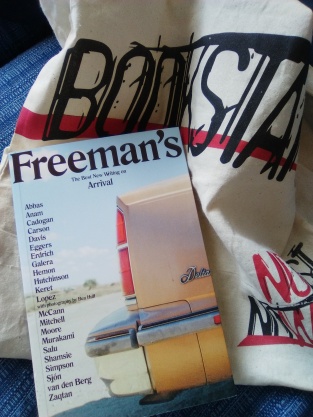 Where is East, where is West? Where do you cross from one to another? Can you understand one without the other? Can you be or have both? The easiest thing to do is keep them separated, imagine or build a wall between them. But what if you can’t have one without the other? What if you don’t have to choose? What if the distinction matters only in the field of basic geography? What if there is a literary festival with guests who create spaces where there is neither East nor West, but just humans and their stories?
Where is East, where is West? Where do you cross from one to another? Can you understand one without the other? Can you be or have both? The easiest thing to do is keep them separated, imagine or build a wall between them. But what if you can’t have one without the other? What if you don’t have to choose? What if the distinction matters only in the field of basic geography? What if there is a literary festival with guests who create spaces where there is neither East nor West, but just humans and their stories?
Aleksandar Hemon
Bosnia and Herzegovina got its first literature festival – an international one at that.
It was about time I say! Congratulations to Buybook for having the courage, for being so decided, so passionate and professional. The significance of the festival is indisputable – the current state of affairs in Bosnia (in the world for that matter) make this kind of events of utmost importance and necessity.
I feel the need to express my gratitude to Aleksandar Hemon (even if it’s only by sending it into the air) for curating the festival and bringing Rabih Alameddine, Kamila Shamsie, Rawi Hage, John Freeman and Mona Eltahawy to Sarajevo – all of them wonderful people.
During these four, holiday-like days there were book launches (both regional and international writers), conversations with publishers (Susan Curtis Kojaković from Istros Books, London, Ivan Bevc from Booka, Serbia and Seid Serdarević from Fraktura, Croatia) and exhibitions. In an attempt to rejuvenate Bosnian literary criticism scene Buybook organized workshops for aspiring literary critics. More than twenty students and graduates from all over Bosnia and Herzegovina got an opportunity to learn from authors, editors, journalists and professors (Freeman, Hemon and Eltahawy included) and the best three of the reviews written during the workshops were rewarded.
The festival aims to have a different country in focus each year. This year the spot was reserved for Turkey. Ece Temelkuran and Mario Levi were invited, but Levi was unable to come due to recent happenings – academics being banned from traveling.
 John Freeman acted as a moderator, leading conversations with Hage, Alameddine, Shamsie and of course Hemon. (Certain people here could learn a lot about the art of interviewing from him.) Conversations were delightful and insightful (particularly the opening night talk with Hemon of which there’s a transcript). They were recorded and can be found on Bookstan’s Facebook page.
John Freeman acted as a moderator, leading conversations with Hage, Alameddine, Shamsie and of course Hemon. (Certain people here could learn a lot about the art of interviewing from him.) Conversations were delightful and insightful (particularly the opening night talk with Hemon of which there’s a transcript). They were recorded and can be found on Bookstan’s Facebook page.
Freeman also presented his literary journal – Freeman’s – which, I am happy to say, found its way into my Bookstan tote bag. Its deliciousness on the subject of arrival was impossible to resist.
A week before the festival I decided I should prepare, so I set myself to reading a novel by each of the international guest writers. I knew Alameddine and Hage by name but never read anything they wrote. Of Kamila Shamsie, I admit, I was completely ignorant. It happened that, of the three of them, she left the deepest impression on me. Reading A God in Every Stone left me breathless, wanting an embrace, a quiet spot to curl up in. I loved Alameddine’s An Unnecessary Woman as well. Both of these books I am going to reread and both of these writers I want to get to know better. Hage’s De Niro’s Game was the most demanding – in terms of content (rough, very heavy) – but very, very well written. I will have to read his Cockroach and Carnival eventually.
Mona Eltahawy was an author who drew a lot of attention. The room was crowded – people eager to hear her talk, giving rounds of rapturous applauses and she elated, on fire. Amazing.
The festival was a real success. Truly beautiful, exhilarating. It felt like home and I already miss it. In fact, I started missing it the minute it was over. The organization was impeccable – everybody agreed, the atmosphere bursting with positive energy.
Looking very much forward to next year, hoping Buybook will manage to make it if not even better then just as good as this one was.